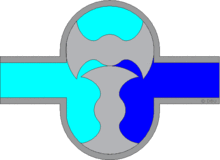hydraulic pump
The hydraulic pump , also known as a hydraulic pump , is a component of hydraulics that generates an almost continuous volume flow . In the rotary lobe pumps that are most commonly used, the volume flow depends on the speed of the pump and remains constant if pressure is created in the hydraulic system through resistances caused by throttling points, switching elements and drives .
Types
| design type | wing | gear | piston | Screws |
|---|---|---|---|---|
| example |
|
|
|
|
| Pressure range [bar] | 70-175 | 200-300 | 350-700 |
Circulatory Concepts
Open circuit
The hydraulic pump sucks in hydraulic fluid from a tank (this can be pressurized with a low pressure of <2 bar to ensure that the piston chambers are filled) and conveys this medium into a hydraulic system. The pressurized hydraulic fluid can then be routed via lines , hoses and valves to " actuators " ( hydraulic cylinders , hydraulic motors ) and do work there.
Closed circle
The main difference to the "open circuit" is that the hydraulic pump is fed directly with the hydraulic fluid returned from the actuator (hydraulic motor). The pump is "clamped" from two sides - the suction side and the pressure side. The external leakage occurring at the pump and the individual components is compensated / supplemented by an additional feed pump.
Advantages of the closed circuit:
- Due to the clamping of the pump, the natural frequency of the control system is increased and this enables higher (adjustment) speeds
- The structure is energetically more favorable because only the external leakage has to be supplemented and the necessary drive torque is reduced by the load pressure at the pump inlet (suction connection).
- You only need a small hydraulic tank for the feed pump.
Disadvantage:
- The suction connection of the pump must be designed in such a way that it can withstand the maximum permissible load pressure. This means that the suction channel can only be optimized to a limited extent.
- The degassing of the hydraulic oil can be hindered by the small tank
literature
- Dieter Will, Norbert Gebhardt (Ed.): Hydraulics. Basics - Components - Systems, 6th edition, Springer Verlag, Berlin Heidelberg 2014, ISBN 978-3-662-44401-6 .
- Heinrich Matuszewski: manual devices. Friedrich Vieweg & Son, Wiesbaden 1986.
- Marco Lunanova: Optimization of ancillary units. Vieweg Teubner Verlag, 1st edition, Wiesbaden 2009, ISBN 978-3-8348-0730-4 .
See also
Web links
- Hydraulic pumps manual (accessed January 15, 2016)
- Piston engine formulas (accessed on January 15, 2016)

